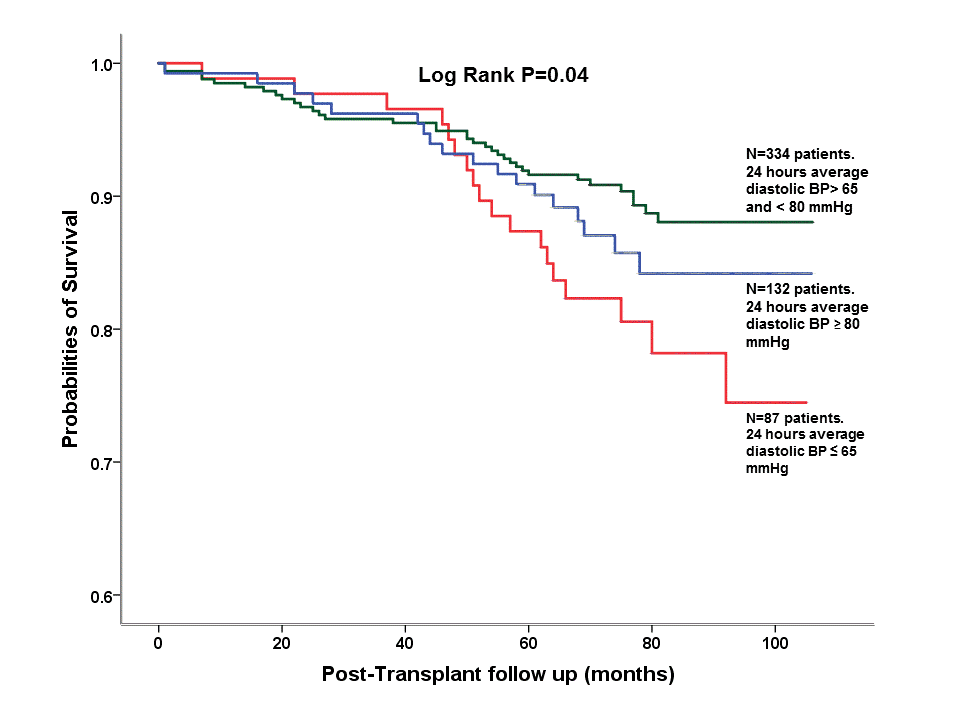Diastolic Blood Pressure Derived from Twenty Four Hour Ambulatory Blood Pressure Monitoring Predicts Survival after Kidney Transplantation
l. Basdeo, H. Wadei, M. Prendergast, M. Mai, C. Oshel, T. Jarmi
Transplant, Mayo Clinic, Jacksonville, FL
Meeting: 2019 American Transplant Congress
Abstract number: C202
Keywords: Hypertension, Kidney transplantation, Survival
Session Information
Session Name: Poster Session C: Kidney: Cardiovascular and Metabolic
Session Type: Poster Session
Date: Monday, June 3, 2019
Session Time: 6:00pm-7:00pm
 Presentation Time: 6:00pm-7:00pm
Presentation Time: 6:00pm-7:00pm
Location: Hall C & D
*Purpose: Cardiac events remain the leading, long term, cause of death after kidney transplantation. In the general population, 50% of cardiac events are attributed to abnormal blood pressure. To our knowledge there are no prior studies addressing the association of Diastolic Blood Pressure (DBP), measured by Ambulatory Blood Pressure Monitoring (ABPM), and mortality post kidney transplant. The Aim of our study is to evaluate the effect of 24-hour average (day and night) DBP, measured between month 4 and 6 post transplantation, on kidney transplant recipients’ survival.
*Methods: We retrospectively analyzed ABPM data from 545 consecutive adult kidney transplant recipients who received the transplant between January 2010 and December 2013. Patients who received combined organs transplant (liver-kidney, pancreas-kidney and heart-kidney) and those who died within 6 months after transplant were excluded from the analysis. ABPM measurements were obtained between 4 and 6 months post-transplant based on our transplant center follow-up protocol. Patients were grouped according to their twenty four hour average diastolic blood pressure (DBP) into three groups; group 1: DBP ≤ 65 mmHg, group 2: DBP > 65 & < 80 mmHg, and group 3: DBP ≥ 80 mmHg. The Primary outcome of our analysis was patients’ survival.
*Results: Overall survival of groups 1 and 3 was significantly (p=0.04) worse compared to group 2 with 9 years follow up (Fig: 1). The age difference between the groups was not significant (p=0.46), group 1 and 3 mean age was 58.4±14.6 and group 2 was 59.34±13.1. The mean 24 hour average systolic blood pressure (SBP) of groups 1 and 3 was 127.6±12.4 mmHg and was not significantly (p=0.09) different from group 2 with mean SBP of 130.1±12.8 mmHg.
*Conclusions: Our study showed that a low (less than 65 mmHg) and a high (above 80 mmHg) average (day and night) twenty four hour diastolic blood pressure, are associated with decrease long term survival in kidney transplant recipients when compared to transplant recipients with average diastolic pressure between 65 and 80 mmHg. Our study signifies the importance of blood pressure, as a modifiable cardiovascular risk factor, which could affect the long term survival after transplantation. Our study also highlights the significance of low diastolic blood pressure (less than 65 mmHg) as an indicator of large blood vessel calcifications in patients with end stage renal disease.
To cite this abstract in AMA style:
Basdeo l, Wadei H, Prendergast M, Mai M, Oshel C, Jarmi T. Diastolic Blood Pressure Derived from Twenty Four Hour Ambulatory Blood Pressure Monitoring Predicts Survival after Kidney Transplantation [abstract]. Am J Transplant. 2019; 19 (suppl 3). https://atcmeetingabstracts.com/abstract/diastolic-blood-pressure-derived-from-twenty-four-hour-ambulatory-blood-pressure-monitoring-predicts-survival-after-kidney-transplantation/. Accessed February 13, 2026.« Back to 2019 American Transplant Congress

